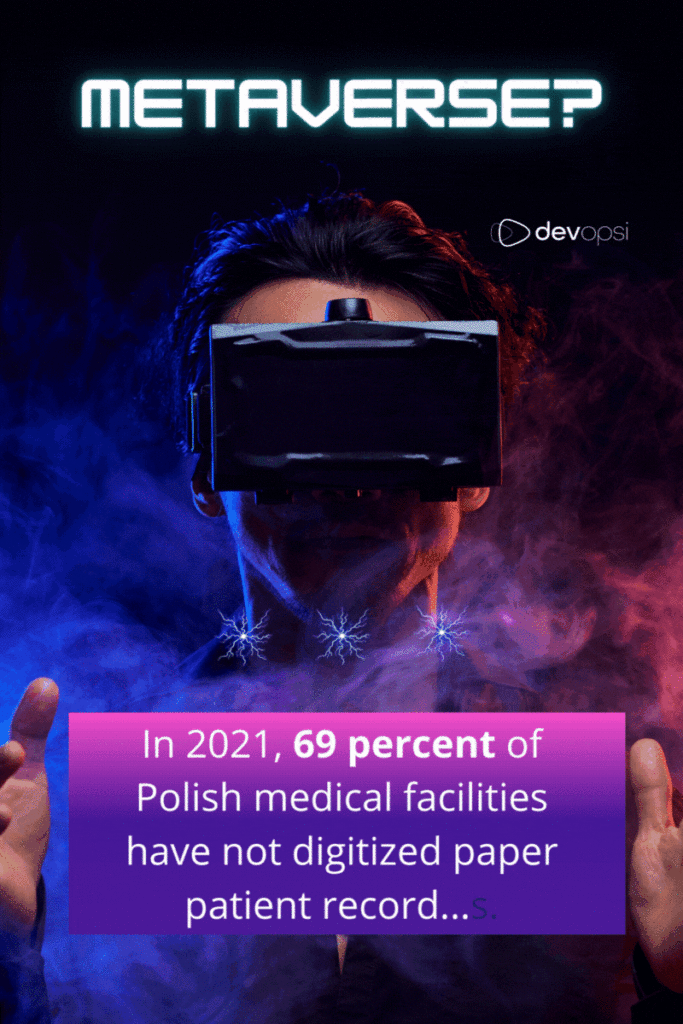Patient care management, diagnostic imaging, surgical consultations, and in the future, remote surgeries. Healthcare is at the highest level and accessible to all. This reality that the visionary metaverse is drawing us seems to be closer than we all thought just a few years ago. Programmers and their startups are working at top speed. But will beautiful visions, Web3, and a three-dimensional virtual world be enough to make this fairy tale come true?
Instrumentation ready for the metaverse
The COVID-19 pandemic and advances in medicine are bringing the ideal world of digital healthcare closer. An example is the development of telemedicine services, which has already found many faces.

Patient care management, diagnostic imaging, surgical consultations, and in the future, remote surgeries, healthcare is at the highest level and accessible to all.Medical diagnostic devices, specialized medical robots, pacemakers and many other pieces of medical infrastructure operating in the rapidly evolving reality of IoT. They all seem to confirm this trend.
Metaverse with a prescription for health
And there is no going back. Paradoxically, advances in medicine have meant that today we have increasingly elderly populations. With chronic diseases that burden healthcare with enormous costs. Nowhere in the world is this system sustainable. Metaverse brings his prescription. Let’s swap queues at clinics, waiting for specialists and key tests at dozens of medical facilities, with the costs of maintaining them, for the comfort of our living rooms.
Fair, ethical access to e-health
Accenture, in its „Accenture Digital Health Technology Vision 2022” report, indicates that in addition to technological challenges, we will experience many other, equally complex ones. What are they? Such as those related to ensuring equitable access to technology for all. Securing patient data, or ensuring patient care and safety too. There are metaverse visionaries who see these problems even more broadly. For example, in terms of unintentional or intentional automation of unethical behavior, an extensive catalog of which humans have created in analog reality.
Technological barriers, however, still appear to be fundamental to the implementation within the metaverse of modern health care. In the United States, before the pandemic, only 43 percent of health centers were able to provide telemedicine services. By 2020, 95 percent will already.
First up: electronic health records (EHR)
Every year, the e-Health Center, which is responsible for the implementation of e-health system solutions in Poland, prepares a questionnaire. „Survey of the Degree of Informatization of Entities Performing Medical Activities.” The latest one, from 2021, shows that 94 percent of medical facilities already have access to a computer network. These are, of course, the premises where medical records are processed. However, only 68 percent of facilities, already have IT solutions that, in terms of Electronic Health Records (EHR), allow them to maintain patient records in electronic form. This refers to the so-called electronic patient record relevant to the patient’s treatment process. These include the patient’s clinical data, course of treatment, test results, diagnostic images, etc.
Documentation on paper, not in digital form

More than 69 percent of medical facilities do not digitize records kept in paper form. Surveyed entities as the most common way of making medical records available to another medical entity most often indicated a hard copy – 93 percent!
37 percent of the entities make medical records available by exporting the records to an electronic medium. And just over 15 percent through electronic services made available from an ICT system.
As in the previous edition of the „Survey,” also this year, 65 percent of health facilities reported that they do not use the HL7 CDA. National Implementation provided by the e-Health Center. HL7 is a formal set of rules for maintaining and storing electronic medical records.
DevOpsi ready to help with EHR
What does all this prove? About the fact that we have a lot of work to do. Before we shape the image of modern healthcare in the Polish metaverse, let’s support it in its digital transformation. Without basic programming efforts, it will be difficult to talk about interoperability. Modern healthcare is not only about modern diagnostic equipment or robots. Also about knowledge of the patient and his diseases. For the patient to get the help he expects, this knowledge must be available wherever the patient appears. We need comprehensive solutions. Are Polish Software Houses ready to offer them? DevOpsi certainly is.
Your Move!
Are you looking for solutions? Need support in EHR implementation?
Write to us. Marta Kosmala will answer all your questions:
